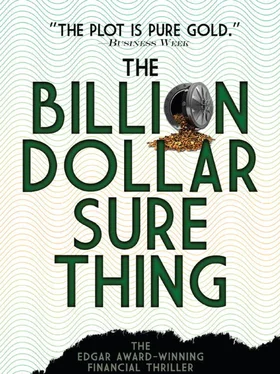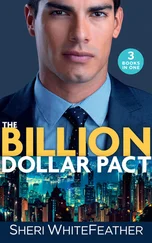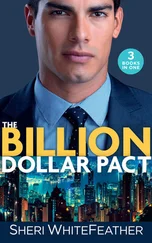Paul Erdman - The Billion Dollar Sure Thing
Здесь есть возможность читать онлайн «Paul Erdman - The Billion Dollar Sure Thing» весь текст электронной книги совершенно бесплатно (целиком полную версию без сокращений). В некоторых случаях можно слушать аудио, скачать через торрент в формате fb2 и присутствует краткое содержание. Город: Mineola, Год выпуска: 2018, ISBN: 2018, Издательство: Dover Publications, Inc., Жанр: Триллер, на английском языке. Описание произведения, (предисловие) а так же отзывы посетителей доступны на портале библиотеки ЛибКат.
- Название:The Billion Dollar Sure Thing
- Автор:
- Издательство:Dover Publications, Inc.
- Жанр:
- Год:2018
- Город:Mineola
- ISBN:978-0-48682-811-4
- Рейтинг книги:3 / 5. Голосов: 1
-
Избранное:Добавить в избранное
- Отзывы:
-
Ваша оценка:
- 60
- 1
- 2
- 3
- 4
- 5
The Billion Dollar Sure Thing: краткое содержание, описание и аннотация
Предлагаем к чтению аннотацию, описание, краткое содержание или предисловие (зависит от того, что написал сам автор книги «The Billion Dollar Sure Thing»). Если вы не нашли необходимую информацию о книге — напишите в комментариях, мы постараемся отыскать её.
Paul Erdman’s fast-paced, suspenseful story centers on a billion-dollar, top-secret coup intended to protect the U.S. dollar. In settings that range from Washington, D.C., to London, Paris, Moscow, and Beirut, a cast of memorable characters enact a plot that brings the world to the brink of the biggest financial explosion in history.
The Billion Dollar Sure Thing — читать онлайн бесплатно полную книгу (весь текст) целиком
Ниже представлен текст книги, разбитый по страницам. Система сохранения места последней прочитанной страницы, позволяет с удобством читать онлайн бесплатно книгу «The Billion Dollar Sure Thing», без необходимости каждый раз заново искать на чём Вы остановились. Поставьте закладку, и сможете в любой момент перейти на страницу, на которой закончили чтение.
Интервал:
Закладка:
“I’ll check this out with Kellermann. In the meantime, just carry out my instructions, Zimmerer. Thank you.”
After Zimmerer had closed the door on the way out, Hofer picked up the phone and dialed four digits.
“Kellermann?”
“ Jawohl , Herr Doktor.”
“Please come up to my office. Now!” He hung up.
The moment he hung up the phone, Hofer regretted his abruptness. Kellermann had a big future with the General Bank of Switzerland. Hofer had personally handpicked him for his current position, the one which Hofer himself had filled for ten years before taking over full command of the bank. He knew that Kellermann did not have it easy.
The big private numbered accounts—that was the bailiwick of Kellermann, as inherited from Walter Hofer. The system was simple. All transactions for such accounts were done under a number only. Even where cash withdrawals were concerned, the client—in the utter privacy of an upstairs conference room—signed for it with his number, written out of course, like “One Hundred and Thirty-five Thousand Six Hundred and Three.” That’s Swiss for John Doe. Only two men in the entire banking organization could identify the name of the account owner with the number of his account: the account executive who set up the arrangement and Kellermann who maintained the master file of these privileged clients. The papers which contained the matching names and numbers were kept in a special safe—a huge one—solely under Kellermann’s control. It was as burgler- and fireproof as modern technology would allow. But, as still a further safeguard, completely matching documents were kept in another vault, buried deep in an Alpine cavern in a small town in the Gotthardt Pass. It was literally bombproof. The key importance of the system lay in the fact that no internal spy, who, experience had taught long ago, could easily slip into a banking organization, could get at this strategic information. For strategic it was. As a group, the people behind these numbers kept assets totalling $20 billion at the General Bank of Switzerland. Brazilians, Frenchmen, Germans, Argentines, British. They were the old hands in the use of this system. But since the 1960s countless newcomers, from New York, Miami, Las Vegas, Washington, Seoul, Bangkok, Saigon, Taiwan, Hong Kong, had joined the ranks. And then there were the ex-Cubans, the ex-Algerians, ex-kings, ex-finance ministers, ex-presidents, ex-gangsters, many of doubtful nationality not to speak of residency, who regularly enjoyed the traditional hospitality of Switzerland.
The motives of all of these people were essentially the same. They sought protection from immoral intrusions into their private affairs. What could be more private than money? Nothing, said the Swiss, absolutely nothing. And they really meant it, with evangelical fervour. Sure, perhaps some of this money which sought refuge from prying eyes was untaxed. Perhaps it had been illegally smuggled out of Latin America or Asia into Switzerland. Maybe it was stolen. This was not Switzerland’s concern. If nations insisted upon introducing unreasonably high taxes or foreign exchange controls limiting one of man’s God-given freedoms to do what he likes with the money he amasses, that was their fault. Also a crime in Chicago was not necessarily one in Zurich. History had always proved that in money matters the Swiss were right and the rest of the world had been consistently wrong. Little did the world realize the benefits it accrued from this attitude. For it was banks like the General Bank of Switzerland which took what the incurable cynics insisted upon calling “black money,” bleached it, and put it to work productively; money which otherwise would have remained hidden and idle. Thus Switzerland was able to mobilize capital, lend it to industry, and raise the living standards of the world. Its banks regularly told their clients to buy World Bank bonds for their numbered accounts, thus truly helping—in concrete terms—those underprivileged in the developing countries. It was Swiss banks who opened the way for prudent men to buy gold, as a warning to those governments who sought to undermine the currencies of the world through reckless spending programs, which only led to inflation and the indirect confiscation of the hard-earned savings of countless numbers of the aged and afflicted. It was banks like the General Bank of Switzerland which offered the facilities enabling people from all countries to buy stocks and contribute to the survival of the free world in its fight against communism. The job, though difficult, was truly rewarding.
Due to misunderstanding, to envy, one could never be too careful, however. Even vis-à-vis one’s own employees; pathetic but true in these days of long-haired clerks and gum-chewing secretaries. Even the young officers of the bank could no longer be trusted. They were all too often the products of chaotic universities, of confused professors who did not realize that making money with money represents the very heart of the system which has finally given dignity to a good part of mankind. The numbered account system, which in Hofer’s mind represented capitalistic perfection, the ultimate response to challenge in the area of finance, was only as good as its guardians. In this regard, Kellermann was perfect. Well, almost perfect. His devotion to the Roman Catholic Church was often disturbing. He did not have to advertise it as he did. After all, the General Bank of Switzerland was a Protestant bank, like almost all of its sister institutions in Switzerland, or for that matter, also in the United States. This was so for good reasons. It was upon the Protestant ethic that all this was built. There were standards to be maintained, confidence to be preserved. To be sure, there was much to be said for ecumenical progress. As long as it did not go too far. Hofer had been one of the first financial leaders of his country to embrace the movement. But he saw himself as a pillar of moderation. More than once he had had to raise his voice in restraint to point out that the moral strength of Zurich stemmed from Zwingli, from Calvin, whose teachings were hardly compatible with the machinations of a Leo or a Gregory, not to speak of the hypocrisy of a Pius. To be sure, they were part of the past, but the Jesuits were obviously very much part of the present. The Swiss Constitution still banned them from the country. Correctly so. It may well be that their tactics had changed, but had their basic philosophy? The confusion of ends and means. This was not the Swiss way of approaching things, and every enlightened Catholic must also realize this. Or be convinced. One stood up for what one knew was right and, if necessary, died on the battlefield like Zwingli for one’s faith and country.
The buzzer startled Hofer. He seldom got caught day-dreaming in this manner.
Kellermann entered the room and approached Hofer’s desk.
“Glad to see you back, Dr. Hofer,” he said. “I hope your trip to Johannesburg was satisfactory.”
“It was. Please be seated. I’ve just had a brief talk with Zimmerer of the foreign exchange department. He tells me that you gave him a very large open order to buy gold bullion and sell the dollar short. For a numbered account. What’s the story on that?”
“The client is an American. A certain Mr. Stanley Rosen from New York. We know him well. That is, our branch in Basel knows him. He’s been a major depositor there and has done a lot of securities business with them over the years. In fact, he’s high volume all around. Rosen was one of our first overseas clients to make major Eurocurrency placements. Our Basel people tell me that they have had as much as $200 million outstanding for his accounts at one time—all on the usual trust basis.”
“It is hardly his money.”
“No, sir. Our people in New York have provided us with some background information on the man. It would seem that he has rather irregular types of people for whom he manages money, if you know what I mean. But this is no concern of ours. To date he has been absolutely correct in all of his dealings with us. Very exact, but very correct. Of course he receives no correspondence from the bank. He comes over and goes through the dossiers on his accounts with Widmer over in Basel about every other month.”
Читать дальшеИнтервал:
Закладка:
Похожие книги на «The Billion Dollar Sure Thing»
Представляем Вашему вниманию похожие книги на «The Billion Dollar Sure Thing» списком для выбора. Мы отобрали схожую по названию и смыслу литературу в надежде предоставить читателям больше вариантов отыскать новые, интересные, ещё непрочитанные произведения.
Обсуждение, отзывы о книге «The Billion Dollar Sure Thing» и просто собственные мнения читателей. Оставьте ваши комментарии, напишите, что Вы думаете о произведении, его смысле или главных героях. Укажите что конкретно понравилось, а что нет, и почему Вы так считаете.












